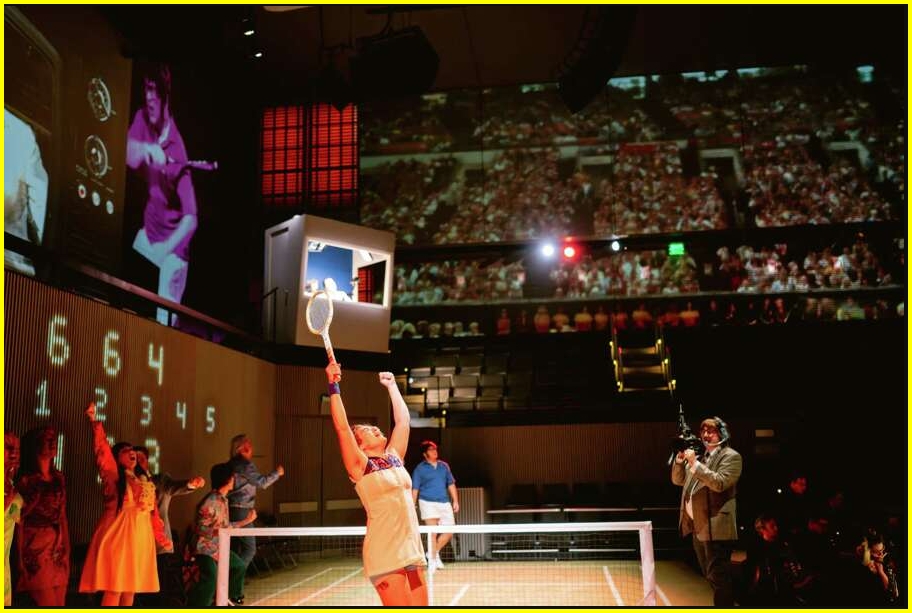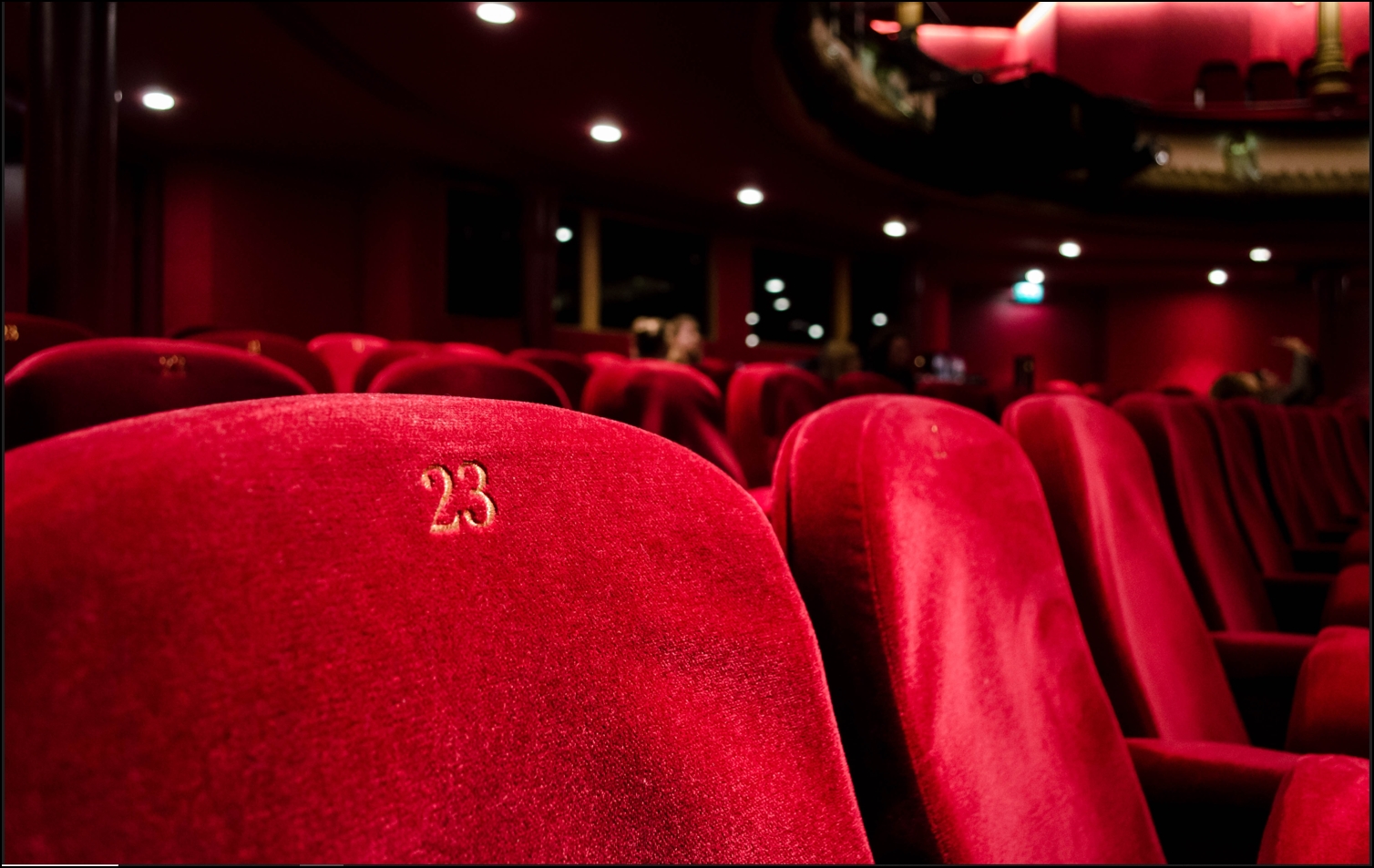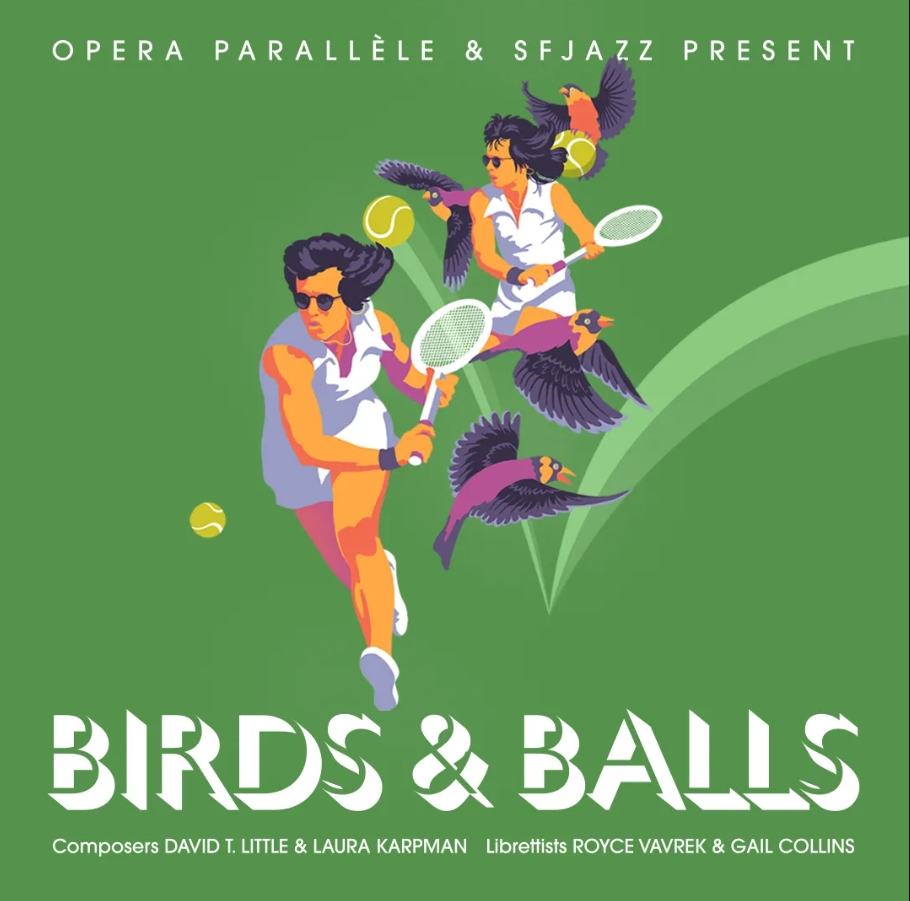By Jeff Dunn
Sports spectators usually take sides. So can opera composers—say, Puccini in that heavyweight match, Scarpia vs. Tosca. But what do composers do when an opera is a spectator sport taking place on stage?
On April 5th, Opera Parallèle provided two fascinating examples of sports opera and the “sides” promoted by two composers, David T. Little and Laura Karpman. Little took on an obscure Belgian bird-call competition called Vinkensport, and Karpman had a swing at exhibition tennis with the King/Riggs “Battle of the Sexes” match of 1973. Creative Director Brian Staufenbiel brilliantly collaborated with the composers to subsume Little’s opera into the 1973 ABC Wide World of Sports broadcast moderated by immoderate Howard Cosell. Parallèle publicized the combination cleverly as Birds and Balls.
… I was happy to be a spectator …
The upshot was that Karpman’s sympathies (and librettist Gail Collins’) were with Billy Jean King, but the music was rooting for Riggs. In contrast, Little’s music and Royce Vavrek’s libretto were rooting for all the competition participants, especially the birds.
The evening began with Little’s 45-minute Vinkensport, or the Finch Opera, which premiered in 2010 and was revised in 2018. In it, six contestants with sticks sit in a line with their trained chaffinches in boxes and count each series of chirps their birds emit. (You can hear the sound at https://www.youtube.com/watch?v=COllwlh-jXo.)
Each count is supposed to be marked with chalk on the sticks; the trainer with the most counts at the time limit wins. Although sticks were present, no chalk marks were made, nor were calls heard, so audience members not reading up on the details of this bizarre activity were probably confused about the rules. The six contestants did sing a chorus depicting the calls and marks: “Susk-e-wiet, Susk-e-wiet, Susk-e-wiet, Tick, Tick, Tick, Tally.”

Not that the contest itself mattered. Like the musical A Chorus Line, Vinkensport is really about the hearts and souls of the contestants. Each has a backstory and an attitude. These are absorbing, utterly human, and superbly conveyed by the libretto, projected videos, and especially, the rhythmic and orchestral variety found in Little’s music. A testament to the effectiveness of characterization is that the audience cares for the two cheaters of the six as much as for the four others: a sex-starved yet religious wife, a dutiful son who hates the sport, an alcoholic trophy wife, and a principled yet lonely man who ends the opera with a moving farewell to his bird, “Atticus Finch,” whom he releases to the skies after a decade of service.
In contrast to the depth of Vinkensport was the glitz and bang of the second opera Balls, a premiere which I suspect needs a bit more polish. In it, honoring of women’s political progress by the victory of Billie Jean King is undercut by the extended satire of Seventies styles and fashions, “Laugh-in” funny as they are. The over-the-top self-promotion by the Bobby Riggs character is accompanied by music with a disjointedness that seems undistinguishable from King’s music, which should convey a more steady and subdued determination. Rather than highlighting a Seventies moment in time, the opera contrarily includes the appearance of Susan B. Anthony in 19th-century dress. Perhaps this underlines women’s striving for progress and the continuing failure of the ERA to cap it today.
However these two operas fare in the future, either together or separately, I must vouch for the incredible job the entire Opera Parallèle team did in mounting them under Nicole Paiement’s and Brian Staufenbiel’s supervision and creative input.
All performers were outstanding, most especially Nathan Granner as both Hans Sachs’ cocaine-hypered trainer in Vinkensport and Bobby Riggs in Balls. David Murakami’s projections and Lawrence Dillon’s videos greatly enhanced the proceedings. The impressive Nikola Printz sang Billie Jean King. Jamie Chamberlin, Daniel Cilli, Chelsea Hollow, Shawnette Sulker, and Chung-Wai Soong wonderfully embodied their distinct Vinkensport characters.
Finally, Mark Hernandes did a fine job sporting Howard Cosell’s unique approach to English. And I was happy to be a spectator to the whole operation.
-30-
 ASR’s Classical Music Section Editor Jeff Dunn is a retired educator and project manager who’s been writing music and theater reviews for Bay Area and national journals since 1995. He is a member of the San Francisco Bay Area Theatre Critics Circle and the National Association of Composers, USA. His musical Castle Happy (co-author John Freed), about Marion Davies and W.R. Hearst, received a festival production at the Altarena Theater in 2017. His opera, Finding Medusa, with librettist Madeline Puccioni, was completed in January 2023. Jeff has won prizes for his photography, and is also a judge for the Northern California Council of Camera Clubs.
ASR’s Classical Music Section Editor Jeff Dunn is a retired educator and project manager who’s been writing music and theater reviews for Bay Area and national journals since 1995. He is a member of the San Francisco Bay Area Theatre Critics Circle and the National Association of Composers, USA. His musical Castle Happy (co-author John Freed), about Marion Davies and W.R. Hearst, received a festival production at the Altarena Theater in 2017. His opera, Finding Medusa, with librettist Madeline Puccioni, was completed in January 2023. Jeff has won prizes for his photography, and is also a judge for the Northern California Council of Camera Clubs.
| Production | "Birds" (Vinkensport) and Balls |
|---|---|
| Directed by | Brian Staufenbiel |
| Producing Company | Opera Parallèle |
| Production Dates | Thru April 7th |
| Production Address | SF Jazz Miner Auditorium 201 Franklin St, SF, CA 94102 |
| Website | www.operaparallele.org |
| Telephone | (415) 392-4400 |
| Tickets | $40- $180 |
| Reviewer Score | Max in each category is 5/5 |
| Overall | 4.5/5.0 |
| Performance | 4.5/5.0 |
| Music (Vinkensport) | 4.5/5.0 |
| Music (Balls) | 3.5/5.0 |
| Libretto (Vinkensport) | 4.5/5.0 |
| Libretto (Balls) | 4.5/5.0 |
| Stagecraft | 4.5/5.0 |
| Aisle Seat Review Pick? | YES! |

